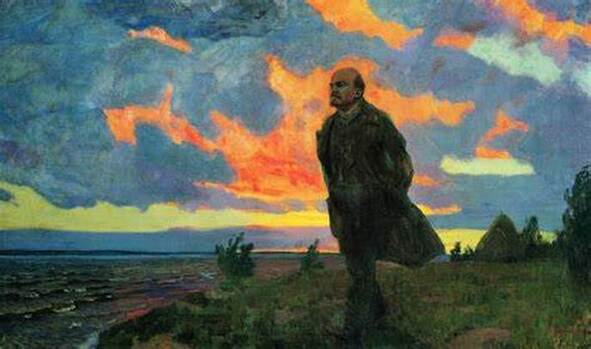|
12/10/2021 V. I. Lenin - Materialism & Empirio-Criticism. Commentary and Analysis (11/23). By: Thomas RigginsRead NowCHAPTER THREE: THE THEORY OF KNOWLEDGE OF DIALECTICAL MATERIALISM AND OF EMPIRIO-CRITICISM III SECTION ONE: "What is Matter? What is Experience" Lenin says the first question is posed to the materialists while the second is put to the idealists (including the Machists) and agnostics. About 'matter' Avenarius says, "Within the purified, 'complete experience' there is nothing 'physical'-- 'matter' in the metaphysical absolute conception -- for 'matter' according to this conception is only an abstraction...." This theory Lenin calls "disguised subjective idealism." Mach says, "What we call matter is a certain systematic combination of the elements (sensations)." This is also subjective idealism. Lenin also has a quote from Karl Pearson's (1857-1936)The Grammar of Science to the same effect. He also says that the Russian Machists are totally off base when they equate these views to those of modern science. They are simply the old views of the idealists dressed up in new clothing. Matter, Lenin says, "is that which, acting upon our sense-organs produces sensation." Bogdanov doesn't like this formulation and complains that materialists are not advancing and that their arguments, in his words, "prove to be simple repetitions." This only shows his ignorance as there are in fact basically only two main lines in philosophy with regard to this issue. "One expression," Lenin points out, "of the genius of Marx and Engels was that they despised pedantic playing with new words, erudite terms, and simple 'isms', and said simply and plainly: there is a materialist line and an idealist line in philosophy, and between them there are various shades of agnosticism. The vain attempts to find a 'new' point of view in philosophy betray the same poverty of mind that is revealed in similar efforts to create a 'new' theory of value, a 'new' theory of rent, and so forth." So much for "matter." Now, how is "experience" used in empirio-criticism? I should say right off the bat that Lenin says "experience"-- the major concept of empirio-criticism -- is not clearly defined by the empirio-critics! With Avenarius it is vague and circular as when he says "pure experience is experience to which nothing is admixed that is not in its turn experience." This is a definition which the philosopher A. Riehl (1844-1924) in 1907 said "obviously revolves in a circle". And, Norman Kemp Smith (1872-1958), in Mind vol. XV, remarked, "The vagueness of the term 'experience' stands him in good stead, and so in the end Avenarius falls back on the time-worn argument of subjective idealism." Mach even goes so far as to say, "The acceptance of a divine original being is not contradictory to experience." The confusion over this term can be seen in its use by Bogdanov. According to Lenin, when Bogdanov says, "consciousness and immediate mental experience are identical concepts" and that matter is "not experience" but "the unknown which evokes everything known" he is being an idealist. Yet he is being a materialist when he says that those who go beyond experience only arrive at "empty abstractions and contradictory images, all the elements of which have nevertheless been taken from experience." Mach in several works makes pronouncements in a materialist vein, so much so in fact that Lenin says he "instinctively accepts the customary standpoint of natural scientists, who regard experience materialistically." All this goes to show that Engels was correct in saying there are only two fundamental positions with regard to "experience"-- i.e., the materialist and the idealist. SECTION TWO: "PLEKHANOV'S ERROR CONCERNING THE CONCEPT 'EXPERIENCE'" This is a short section where Lenin wants to correct a statement Plekhanov made in his book L. Feuerbach. Plekhanov wrote, "A German writer has remarked that for empirio-criticism experience is only an object of investigation, and not a means of knowledge. If that is so, then the contrasting of empirio-criticism and materialism loses all meaning and discussion of the question whether or not empirio-criticism is destined to replace materialism is absolutely vain and idle." Lenin thinks this is a "complete muddle." According to Lenin, Plekhanov must have had in mind, and not really understood, the following from Avenarius filtered through his disciple F. Carstanjen (1864-1925) Lenin says, "Fr. Carstanjen is almost literally quoting Avenarius, who in his Notes emphatically contrasts his conception of experience as a 'means of knowledge' in 'the sense of the prevailing theories of knowledge, which essentially are fully metaphysical." Now, Carstanjen maintains that Avenarius did not investigate if experience , i.e., "all 'human predications', as the object of investigation" was real or not. What he did was simply classify "all possible human predications, both idealist and materialist, without going into the essence of the question." As a result, Plekhanov's muddled conclusion above is unwarranted and in error. Next Up: We will begin with Section Three of this chapter: "Causality and Necessity in Nature. AuthorThomas Riggins is a retired philosophy teacher (NYU, The New School of Social Research, among others) who received a PhD from the CUNY Graduate Center (1983). He has been active in the civil rights and peace movements since the 1960s when he was chairman of the Young People's Socialist League at Florida State University and also worked for CORE in voter registration in north Florida (Leon County). He has written for many online publications such as People's World and Political Affairs where he was an associate editor. He also served on the board of the Bertrand Russell Society and was president of the Corliss Lamont chapter in New York City of the American Humanist Association.
0 Comments
Leave a Reply. |
Details
Archives
January 2022
Categories |


 RSS Feed
RSS Feed